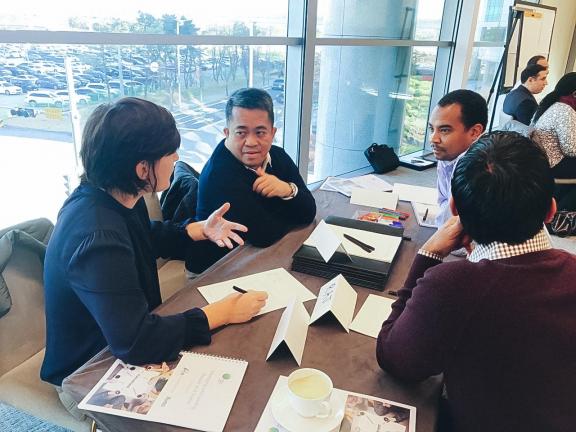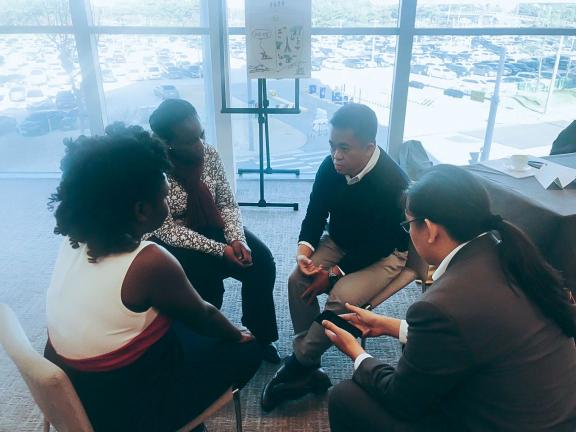A tribute to Leo Paat Jr.
A passion for the environment, a commitment to social justice, and a quiet dignity
Three months ago the Green Climate Fund mourned the loss of Leonardo Paat, our dear friend and colleague. Leo died from COVID-19-related complications in August, several months after being diagnosed with the virus upon his return to Korea from a GCF Board meeting.
Leo left behind family, friends, and colleagues around the world who were shocked and saddened by his death. We treasure the memories of Leo’s quiet dignity and integrity, as well as his gentle humour, generosity, and kindness. He deeply cared for the environment, and also about people - those he knew and loved, but also those marginalised people around the world whose voices he worked tirelessly to amplify.

Many stories were told about Leo during the memorial we held for him in August. A hugely difficult moment was made even more challenging since COVID-19 meant that the memorial was a hybrid of small gatherings throughout the GCF office, linked together virtually with others from around the world. Tears were shed, and some smiles were shared, as stories were told and memories recalled. The affection and respect for Leo shone through the tributes. Leo was a quiet man, dedicated to his family, and strongly connected to his roots in the Philippines. He was respected and loved by his colleagues at GCF both for his professional expertise and his personal character.
Leo joined GCF after having worked on environment protection for many years. He was a Senior Environment Specialist with the World Bank from 2013-16 in his home country the Philippines. Previously he was an environmental consultant with the World Food Programme, and also led environmental technical programs in the Gulf region. Earlier in his career, before moving to the international level, he worked on domestic environmental conservation in the Philippines, including in his home province of Cagayan.
Leo had been with the Fund since 2016. That may only have been a few years, but in the short life of GCF he was a calming, reassuring ever-presence within the maelstrom, excitement, and growing pains of a rapidly changing organisation. Arriving at GCF at a time when the Environment and Social Safeguards (ESS) team was just being established, he used his determination, diplomacy, and expertise to raise the profile of ESS, grow the team, and develop the safeguards policies and practices that are so essential to GCF’s work.
Leo has left a huge legacy of personal and professional achievements. We count ourselves very fortunate to have benefited from his passion, commitment, and expertise. Leo served GCF first as Environment Specialist, then as Senior Environment and Social Specialist and latterly as Environment and Social Safeguards, Gender and Indigenous Peoples Manager. This is a tribute to Leo’s lasting contribution to the Green Climate Fund.
Gender
When Leo first joined the Fund one of his first tasks was to oversee the development and adoption of the Updated Gender Policy. At the time the ESS / gender team was very small, with just a couple of staff members and some consultants supporting them. Securing the adoption of this critical, and sometimes politically challenging policy required all of Leo’s patience, diplomacy and warmth. He was instrumental in supporting the ongoing discussions with Co-Chairs, Board members and representatives of civil society organisations. He listened to their concerns, and the issues they raised, establishing a trusted reputation that was essential to success. Leo was determined, but also patient. He needed both qualities as he led and worked on the draft policy. As it went through its many revisions, Leo worked tirelessly, always remaining positive until he saw it through to approval. Along the way there were many tense moments and stressful times. The policy appeared on the agenda of several Board meetings, but each time it was postponed or opened but not adopted. Amidst the setbacks and challenges, Leo stood up as a manager and leader, taking responsibility if things went wrong, never blaming others and keeping his team’s spirits high and their attitude resolute. A true leader and team player, Leo persisted until the updated policy was updated at the twenty fourth Board meeting (B.24) in 2019. Always humble and modest, Leo refused credit for himself, but preferred to keep in the background.

The revised policy gives greater guidance on integrating a gender approach into GCF’s work. It provides explicit requirements, and the detailed means to make sure adherence is ensured within project agreements and their term sheets. GCF mainstreams a gender approach from the outset, ensuring that there is a gender assessment and action plan for every funding proposal. This means that gender is highlighted as an issue from the outset of every project, and gender considerations are built into project design.
Environmental and Social Safeguards (ESS)
In May 2014 GCF’s Board adopted interim environmental and social safeguards based on the International Finance Corporation’s Performance Standards for Environmental and Social Sustainability. At the same time, the Board requested the Secretariat to develop an environmental and social management system (ESMS). This substantial project became a key part of Leo’s work when he joined the Fund in 2016. Leo guided the development of this major project, and was instrumental in ensuring that GCF’s Environmental and Social Policy (ESP) was adopted by the Board in 2018. The ESP is an essential element of the ESMS which defines the commitment of GCF to integrate environmental and social issues into its decision-making and outcomes. In particular, it establishes the principles, requirements, and responsibilities to deliver on these commitments. As the centrepiece of the ESMS, the ESP was a crucial document. Leo led the drafting of the ESP, and was responsible for taking it through the various stages of consultation and internal approval before it was laid before the Board. The ESP clarified what GCF expects from its project partners (Accredited Entities) in relation to the environmental and social safeguards that apply to different categories of projects, providing a baseline and guidance for those partners to follow. As such, the ESP not only influences how GCF works, but also provides guidance for multiple organisations around the world. Securing the adoption of the policy was a major achievement. Implementing it was then a huge managerial responsibility, and with only a small team to work with, Leo again played a crucial role in the herculean task of ensuring all GCF project proposals are reviewed for compliance with the policy.

More work remains to be done on ESS, and until his untimely death Leo was overseeing the development of GCF’s own environmental and social safeguards based on an approach approved by the Board in 2019. The process of moving beyond the IFC’s Performance Standards and developing GCF’s own ESS is to be completed once GCF has built up a track record of experience and lessons learned. It will be guided by evolving international best practices, with the aim of establishing a framework to support GCF in carrying out its mandate in a sustainable manner that effectively and equitably manages environmental and social risks and impacts and improves the outcomes of all its activities. Leo’s work on the ESS is being continued by his colleagues in the ESS team, so that the commitments set out in the Environmental and Social Policy can be fully realised.
Indigenous Peoples Policy (IPP)
The Indigenous Peoples Policy is perhaps the most groundbreaking work that Leo was involved in delivering during his time at GCF. Indigenous peoples' organisations have fought hard to put the issue on the agenda of environmental and development funders, and GCF is one of the first organisations to adopt a comprehensive policy that focuses both on protection from harm, and on ensuring benefits from climate activities for indigenous communities. GCF’s IPP is ground-breaking, a major achievement that has been lauded by indigenous peoples organisations. It is the gold standard for international organisations, and its implementation will have a huge impact on GCF projects around the world.
The policy takes a broad definition of the indigenous peoples that it covers, and ensures rights to participation. It provides access to GCF’s redress mechanism, as well as promoting access to finance to access that mechanism. IPP is designed to ensure that indigenous peoples should be consulted from the outset, and can participate in shaping and implementing projects that will impact them. With around one third of GCF’s projects to date affecting indigenous peoples, the IPP will have a wide-ranging and lasting impact. Having recruited GCF’s first Indigenous Peoples Specialist into his ESS team in 2019, Leo was continuing to support the development and implementation of this policy, including the development of operational guidelines.
The legacy of Leo’s professional work provides the GCF Secretariat with the essential safeguard policies that we need. Policies to ensure respect for environmental and social standards. Policies to ensure a gender-sensitive approach. Policies to ensure indigenous peoples have their rights recognised. We know that much work remains to be done to ensure the implementation of these policies, and to ensure that GCF’s actions on the ground match our commitments. As we strive to realise and promote these policies throughout our activities, we will do so in Leo’s memory.

You can find out more about GCF’s environmental and social standards, gender policy, and indigenous peoples policy on our website.